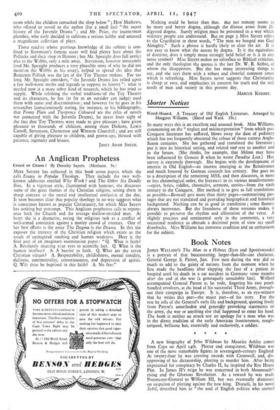An Anglican Prophetess
Creed or Chaos ? By Dorothy Sayers. (Methuen. 5s.)
MISS SAYERS has collected in this book seven papers which she calls Essays in Popular Theology. They include the two well- known addresses entitled Why Work ? and The Other Six Deadly Sins. In a vigorous style, illuminated with humour, she discusses some of the great themes of the Christian religion, setting them in sharp contrast to the moral and intellectual confusion of the day. It soon becomes clear that popular theology in no way suggests what is sometimes known as popular Christianity, for which Miss Sayers has nothing but contempt. This Anglican prophetess calls to repent- ance both the Church and the average shallow-minded man. At heart she is a dramatist, seeing the religious task as a conflict of well-armed conviction against a motley- crowd of enemies. One of her best efforts is the essay The Dpgma is the Drama. In this she exposes the travesty of the Christian religion which exists as the result of uninspired teaching and human weakness. Here is the final part of an imaginary examination paper : "Q. What is faith? A. Resolutely shutting your eyes to scientific fact. Q. What is the human intellect? A. A barrier to faith. Q. What are the seven Christian virtues? A. Respectability, childishness, mental timidity, dullness, sentimentality, censoriousness, and depression of spirits. Q. Wilt thou be baptised in this faith? A. No fear."
Nothing could be better than that. Stu her remedy seems to be more and better dogma, although the disease arose from ill- digested dogma. Surely religion must be presented in a way which ordinary people can understand. But on page 3 Miss Sayers refers to the Crucifixion in these words, "The man we hanged was God Almighty." Such a phrase is hardly likely to clear the air. It is not easy to know what she means by dogma. Is it the equivalent of doctrine, does it simply mean strongly held belief or is it in any sense symbol? Miss Sayers-makes no reference to Biblical criticism, and the only theologian she quotes is the late Dr. W. B. Selbie, of whom she disapproves. But she has many interesting things to say, and she says them with a robust and cheerful common sense which is refreshing. Miss Sayers never suggests that Christianity is cheap or easy, and emphasises its concern for truth and the real needs of man and society in this present day.
MARCUS KNIGHT.


































 Previous page
Previous page